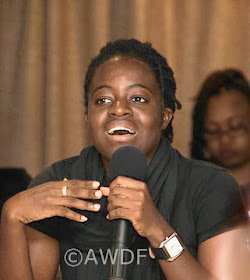 (Re)Discover Sarah Maldoror
(Re)Discover Sarah MaldororA portrait of the filmmaker Sarah Maldoror, one of the rare socially-politically committed women cinéastes involved in the liberation struggles in Angola. She strives through her films, to make the experiences of war in Africa known. As a politically engaged filmmaker, Sarah Maldoror has always believed in the importance of cinema as a means to depict politic and social change and the struggles for independence. Having acquired real experience during the bloody wars against the Portuguese colonizer, she uses cinema as a means to express herself and as an artistic tool for struggle. Through excerpts from Sarah Maldoror's films and testimonies of francophone writers and actors, the film reveals a concise approach to her character, to her fight for problems concerning Black people, the defense of black writers of the French language, and her artistic choices: films such as Fogo, sur les îles du Cap-vert, brings into question the colonial past, as well as fiction works such as Sambizanga, regarding the liberation movements in Angola, or Damas, regarding French Guiana, all of which, as examples of her repertoire of works, highlight the solidarity of these people.
(The 1998 film, Sarah Maldoror ou la nostalgie de l'utopie by Togolese Anne-Laure Folly, pays tribute to Sarah Maldoror and her work)
Portrait de la réalisatrice Sarah Maldoror, l'une des rares femmes
cinéastes engagée au côté des luttes de libération en Angola, qui
s'attache à faire connaître par ses films les guerres africaines.
Réalisatrice engagée, Sarah Maldoror a toujours cru dans l’importance du
cinéma pour dépeindre les changements politiques et sociaux et les
luttes pour l’indépendance. Ayant acquis une réelle expérience durant
les guerres sanglantes contre le colonisateur portugais, elle s’exprime à
travers le cinéma, revendiquant cette forme d’art comme outil de
combat. A travers des extraits de ses films, et des témoignages
d'écrivains et comédiens francophones, ce film offre une approche
précise du personnage de Sarah Maldoror, de son combat pour la question
noire, la défense des écrivains noirs de langue française, et de ses
choix artistiques : les films comme Fogo, sur les îles du Cap-vert,
mettant en cause le passé colonial, ou des fictions comme Sambizanga,
sur les mouvements de libération en Angola, ou encore Damas sur la
Guyane française, sont autant d'exemples de l'œuvre de cette
réalisatrice toute entière tournée vers la solidarité avec ces peuples.
(Sarah Maldoror ou la nostalgie de l'utopie (1998) de la Togolaise Anne-Laure Folly, rend hommage à Sarah Maldoror)
(Sarah Maldoror ou la nostalgie de l'utopie (1998) de la Togolaise Anne-Laure Folly, rend hommage à Sarah Maldoror)
Articles on the African Women in Cinema Blog:
Sarah Maldoror: Retrospective
https://africanwomenincinema.blogspot.com/2021/10/sarah-maldoror-cinema-tricontinental.html
Reflections on Sarah Maldoror
https://africanwomenincinema.blogspot.com/2020/05/reflections-on-another-gaze-presents.html
Sarah Maldoror: Behind the cloud | Derrière le nuage
https://africanwomenincinema.blogspot.com/2020/04/sarah-maldoror-behind-cloud-derriere-le.html
Remembering Sarah Maldoror : A Pioneer in Cinema
https://africanwomenincinema.blogspot.com/2020/04/remembering-sarah-maldoror-pioneer-in.html
Pionnière cinéaste Sarah Maldoror nous a quitté | Pioneer cineaste Sarah Maldoror has passed away (1929 - 2020)
https://africanwomenincinema.blogspot.com/2020/04/pionniere-cineaste-sarah-maldoror-nous.html
https://africanwomenincinema.blogspot.com/2021/10/sarah-maldoror-cinema-tricontinental.html
Reflections on Sarah Maldoror
https://africanwomenincinema.blogspot.com/2020/05/reflections-on-another-gaze-presents.html
Sarah Maldoror: Behind the cloud | Derrière le nuage
https://africanwomenincinema.blogspot.com/2020/04/sarah-maldoror-behind-cloud-derriere-le.html
Remembering Sarah Maldoror : A Pioneer in Cinema
https://africanwomenincinema.blogspot.com/2020/04/remembering-sarah-maldoror-pioneer-in.html
Pionnière cinéaste Sarah Maldoror nous a quitté | Pioneer cineaste Sarah Maldoror has passed away (1929 - 2020)
https://africanwomenincinema.blogspot.com/2020/04/pionniere-cineaste-sarah-maldoror-nous.html
Remise de décorations par Frédéric Mitterrand à Sarah Maldoror
https://africanwomenincinema.blogspot.com/2011/03/sarah-maldoror-remise-des-insignes.html
Sarah Maldoror: Role Model and Pioneer
https://africanwomenincinema.blogspot.com/2010/01/profile-of-sarah-maldoror.html
ALSO SEE:
Português
Um perfil de Sarah Maldoror (Tradução Janaína Damaceno)
http://ficine.org/ (não está mais disponível)
Você ainda não ouviu falar de Sarah Maldoror (1929). Pois bem, ela é uma das principais cineastas de África e tem uma extensa obra ainda pouco conhecida no Brasil. Um dos seus principais filmes, Sambizanga (1972), retrata o papel da mulher durante a guerra civil de Angola onde a cineasta viveu durante anos. O roteiro do filme foi escrito com Mário Pinto de Andrade, poeta e militante contra o colonialismo português, autor de Primeiro Caderno de Poesia Negra de Expressão Portuguesa (1953) e seu marido na época. Neste post, traduzimos o artigo de Beti Ellerson para o seu blog African Women in Cinema, um dos principais canais do mundo a divulgar o trabalho de mulheres negras e africanas no cinema. Boa leitura!
Um perfil de Sarah Maldoror (Tradução Janaína Damaceno)
http://ficine.org/ (não está mais disponível)
Você ainda não ouviu falar de Sarah Maldoror (1929). Pois bem, ela é uma das principais cineastas de África e tem uma extensa obra ainda pouco conhecida no Brasil. Um dos seus principais filmes, Sambizanga (1972), retrata o papel da mulher durante a guerra civil de Angola onde a cineasta viveu durante anos. O roteiro do filme foi escrito com Mário Pinto de Andrade, poeta e militante contra o colonialismo português, autor de Primeiro Caderno de Poesia Negra de Expressão Portuguesa (1953) e seu marido na época. Neste post, traduzimos o artigo de Beti Ellerson para o seu blog African Women in Cinema, um dos principais canais do mundo a divulgar o trabalho de mulheres negras e africanas no cinema. Boa leitura!













